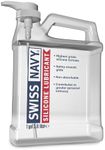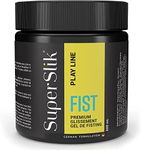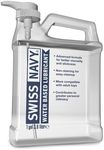Buying Guide for the Best Sex Lubricants
Choosing the right sex lubricant can make intimate experiences more comfortable, enjoyable, and safe. There are many types of lubricants available, each with different properties and uses. Understanding the key features will help you select a lubricant that matches your needs, preferences, and any sensitivities you may have. It's important to consider what you'll be using the lubricant for, whether you have allergies or sensitivities, and if you'll be using it with condoms or sex toys.Base TypeThe base type refers to what the lubricant is made from, and it's one of the most important factors to consider. The main types are water-based, silicone-based, and oil-based. Water-based lubricants are versatile, easy to clean, and safe to use with condoms and most sex toys, but they may need to be reapplied more often. Silicone-based lubricants last longer and are very slippery, making them great for water play, but they can damage silicone toys. Oil-based lubricants provide a lot of moisture and are good for massage, but they can break down latex condoms and may be harder to wash off. To pick the right one, think about how and where you'll use it, and whether you'll need compatibility with condoms or toys.
IngredientsIngredients are important because some people have sensitivities or allergies to certain substances. Lubricants can contain things like glycerin, parabens, fragrances, or flavors. Some of these can cause irritation, especially for those with sensitive skin or prone to infections. If you have sensitive skin or want to avoid certain chemicals, look for products labeled as hypoallergenic or free from added fragrances and flavors. Always check the ingredient list if you have known allergies.
ViscosityViscosity refers to how thick or thin the lubricant is. Thicker lubricants can provide more cushioning and last longer, making them good for anal sex or longer sessions. Thinner lubricants feel more natural and are often preferred for vaginal sex or for use with sex toys. Your choice should depend on the type of activity and your personal preference for texture and feel.
LongevityLongevity is about how long the lubricant stays slippery before you need to reapply it. Silicone-based lubricants usually last the longest, while water-based ones may dry out faster and need more frequent application. If you want a lubricant that lasts through longer sessions or in water, choose one known for its staying power. For quick or spontaneous use, a water-based option might be enough.
Condom and Toy CompatibilityNot all lubricants are safe to use with condoms or sex toys. Oil-based lubricants can weaken latex condoms, increasing the risk of breakage, and silicone-based lubricants can damage silicone toys. Water-based lubricants are generally safe with both condoms and toys. Always check the label to make sure the lubricant is compatible with your chosen protection or toys, especially if safety is a concern.
Added FeaturesSome lubricants come with added features like warming, cooling, flavors, or scents. These can enhance pleasure or add variety, but they may also increase the risk of irritation for sensitive users. If you want to try something new, start with a small amount to see how your body reacts. If you have sensitive skin or are prone to infections, it may be best to stick with simple, unflavored, and unscented options.














